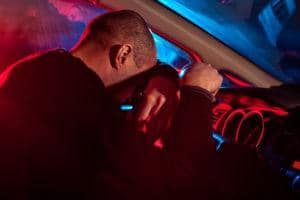 If you were stopped by a police officer and charged with a DWI in North Carolina, you already know how seriously the state takes drinking and driving. Back in 1983 North Carolina did away with specific drug and alcohol driving restrictions, and combined them into one offense called DWI – Driving While Impaired. If you blow a .08, or the officer judges that you were driving while impaired because of other evidence (smell of alcohol, behavior, poor driving), here is what you can expect to go through:
If you were stopped by a police officer and charged with a DWI in North Carolina, you already know how seriously the state takes drinking and driving. Back in 1983 North Carolina did away with specific drug and alcohol driving restrictions, and combined them into one offense called DWI – Driving While Impaired. If you blow a .08, or the officer judges that you were driving while impaired because of other evidence (smell of alcohol, behavior, poor driving), here is what you can expect to go through:
Revocation
First of all, your driver’s license will be revoked for 30 days. This happens automatically, before your trial. If your blood alcohol concentration (BAC) was below .15 when you were arrested, you might be able to apply for limited driving privileges after 10 days, depending on certain conditions and your record. An LDP license allows you to drive to work or school, and for other specific reasons such as a doctor’s appointment. Your attorney will help you get together the documents you need to apply for limited driving privileges. In order to get LDP after 10 days, you will need a DWI Substance Abuse Assessment. If you choose to wait 30 days, you won’t need the assessment unless you are convicted.
Assessment
You can choose an assessment in order to get your LDP license, or you can be ordered to have one after conviction. Basically it is a questionnaire designed to determine if you need treatment for an alcohol problem. You might need to attend drug education classes or, for a more serious problem, inpatient treatment.
Trial
At your trial your guilt or innocence of the charge of DWI will be determined. If you are convicted, the punishments vary depending on how many previous offenses you have, your BAC at the time of arrest, and other factors. These punishments can include:
- License revocation
- Fines of $200 to $10,000
- Imprisonment of 24 hours to 3 years
- Community Service
- Substance abuse assessment and treatment
Ignition Interlock
If you were convicted with a BAC of .15 or higher, you are considered a “high-risk” driver. In that case, you must install an ignition interlock in every vehicle you operate. An ignition interlock, or car breathalyzer, prevents a vehicle from starting if the driver has been drinking. The interlock device will remain on the vehicle for at least one year, and you will be required to pay for installation as well as a monthly monitoring fee.
Under 21
Like many states, North Carolina does not allow people under 21 to drive with any alcohol in their system at all. If you are under 21 and register anything over zero on a breath or blood test, your license is immediately revoked for 30 days. If convicted, you will lose your license for a year.
So…
It’s clear that North Carolina is no place to drink and drive. An attorney will help you navigate the maze of laws and requirements, but it is worth noting that only about 20 percent of DWI cases in North Carolina are dismissed outright. Also, it is unlikely that you will be able to plead guilty of a lesser charge, as is common in some other states. Therefore, your DWI case will either be won or lost at trial.
In short, if you drink and drive in North Carolina the odds are against you, and the laws are tough. So if you’re planning on having some drinks, make the right decision and keep out of the drivers’s seat.
